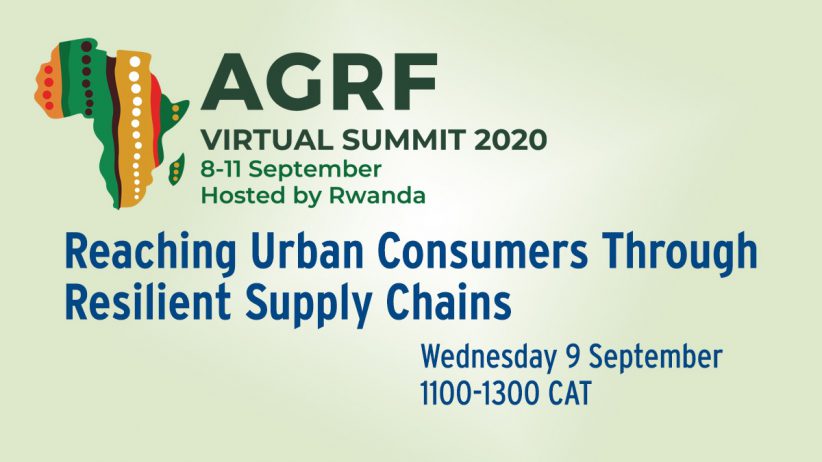The AGRF 2020 Virtual Summit hosted by the Rwandan government in partnership with the Alliance for a Green Revolution (AGRA) was held from 8th to 11th of September, 2020. On the second day, 9th of September, 2020, there was a panel session on “Food Systems and Nutrition: Reaching Urban Food Consumers through Resilient Supply Chain”.
The speakers and panelists comprised of experts in the food supply chains of different African countries. The speakers were Dr. Leonard Mizzi, DG, International Cooperation and Development, EU Commission and Mr. Joost Oorthuizen, CEO, IDH-The Sustainable Trade Initiative. The panelists for the session were Mr. Nnaemeka C. Ikegwuonu, CEO, ColdHubs; Mrs. Toyin Onigbanjo, CEO, August Secrets; Ms. Angel Adelaja, Founder, Fresh Direct; Ms. Robin Miller, Partner and Global Digital & Data Practice Lead, Dalberg Advisors; Dr. Julie Howard, Board member, World Vegetable Center; Mr. Cyril Khamsi, CEO, Kunwe Freight and Ms. Wandie Kazeem, CEO, Wandieville Media, the moderator of the session.
They discussed policies, technologies and investments that are needed to make food systems supply chains more responsive, reliable, and resilient for urban populations in Africa. According to Dr. Leonard Mizzi, the COVID-19 impact was severe and unexpected. He explained that within the first few months of the lockdown, the food systems seemed resilient but subsequently, the impact was felt due to a halt in sea and air cargo operations. He further explained that the issue of linkages between cities and rural areas need to be addressed and youth inclusiveness in different aspects across the value chain has to be enhanced to achieve resilience in food systems to withstand future shocks, in his words… “The first thing which is a risk and vulnerability around Covid we need to address quickly in the short and medium term is the infrastructure gap…linking rural areas to the secondary and mega cities is going to be key…it’s a plea of an offering of a transformation process that our delegations can also engage across the continent”. Mr. Joost Oorthuizen said that there is an urgent call to address issues combating food production and supply in the primary sector. He explained that there has to be a strategy that enhances smallholder farmer engagement; an enabling environment that empowers the smallholder farmer to meet the food demands of city dwellers appropriately. He stated, “… It’s very much about how we engage the smallholder farmers in very meaningful ways across the continent. There is a huge need and urgency to make sure that Sub-Saharan Africa move away from import dependence situation and it is able to feed its cities and population with quality low priced food produced within its continent.”
According to Mr. Nnaemeka Ikegwuonu, increasing cold storage all across Africa will make the food supply system more resilient. He explained that cold storage is a critical element in both the traditional, modern and large scale food supply chain especially in times of pandemic outbreak and natural disasters; it provides a buffer for food storage, supporting food distribution and transportation. He further commented that the major challenge in providing cold storages is the lack of a segmented financing system that incorporates education to create awareness on the importance of cold storage services to key players in the value chain, in his words…” there are so many barriers…but I want to zero in on one of them which also affects our company which is the absence of tailor made large ticket financing to support the rolling out of cold storage infrastructure”. He emphasized that SMEs and social enterprises should be encouraged by creating access to appropriate financing. Mrs. Toyin Onigbanjo spoke on the necessity for a collaborative action between the private sector and public sector. According to her, infrastructural facilities should be provided by the government to enable businesses operate effectively. She said logistics plays a very huge role in ensuring access to nutritious foods, in her words…”producing nutritious food is not the end until it gets to the final consumer…we need to work with the farmers…we also need to work with the tail end, who handle logistics to ensure that the food reaches the final consumers…” Urban agriculture has to be enhanced as explained by Ms. Angel Adelaja who further talked about the need to develop infrastructure to link urban and rural farmers, she stated“…it is about how urban agriculture fits into the food system…If we are able to look at the system differently, get enough data, coordinate rural and urban farmers and try to augment what the nation and cities need, we are able to provide a sustainable strategy…”
Key issues to be addressed in the area of generating digital solutions to agricultural challenges were highlighted by Ms. Robin Miller who spoke about the necessity for collaboration between stakeholders in the sector, in her words”… the first thing is a shift from products to thinking about platforms and a shift from individual solutions to recognizing the opportunity for both aggregation and shifting into platforms…”. Dr. Julie Howard emphasized the need to influence behavioral change alongside the implementation of research findings. According to her, there has to be a change in policies and investments to achieve resilient food systems across the continent, in her words “…it’s not enough to put out research findings; we are going to have to work very purposefully on behavior change…” Mr. Cyril Khamsi stated that there has to be collaborative actions among different players in the value chain to achieve a resilient food system. He further explained that issues of logistics and post-harvest processing have to be addressed to mitigate post-harvest losses, in his words “….there’s many pieces and for it to function all of those pieces have to work coherently as a whole…” Ms. Wandie Kazeem emphasized on the need to create awareness on hidden hunger and the effects of malnutrition. She explained that malnutrition is also a function of poor dietary choices and lack of micronutrients, in her words, “nutrition has never been more important and diversifying diets to include more vegetables and fruits… “. According to her, taking in nutritious meals will supply proper micronutrients to the body which are necessary for the prevention of diseases in these times.
To achieve a resilient food system that withstands shocks in the post Covid-19 era, collaboration among key stakeholders in developing urban agriculture, digital solutions, infrastructure, and proper storage systems has to be enhanced to effectively address challenges within food systems across the continent.





